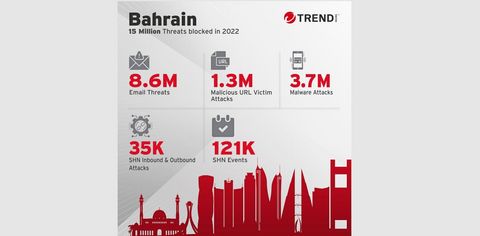Trend Micro blocks 15m cyber threats in Bahrain

More than 8.5 million email threats were detected and blocked by Trend Micro solutions in Bahrain last year, the Japanese multinational cybersecurity firm said in a new report that highlights significant implications for the future of digital security.
The report shows that 3,705,898 malware attacks were identified and stopped in the kingdom while 1,384,056 malicious URL victim attacks, and 3,988 URL hosts were tackled.
The firm’s annual cybersecurity report revealed a significant 55 per cent increase in global threat detections and a massive 242pc surge in blocked malicious files in 2022.
Titled “Rethinking Tactics”, the report highlights concerning trends that have significant implications for the future of digital security.
It emphasised that threat actors indiscriminately targeted both consumers and organisations across all sectors, making 2022 a challenging year for cybersecurity professionals.
“As technology advances rapidly, businesses face both opportunities and challenges. The intricacy of the digital environment has resulted in a surge of cyber threats that can compromise operations and sensitive data. Our latest report emphasises the pressing need for organisations to take a proactive stance on cybersecurity and invest in up-to-date threat intelligence solutions,” said Rasheed Al Odah, managing director for Saudi Arabia, South UAE, Bahrain and Levant, and MEA service director at Trend Micro.
“To effectively mitigate risks and future-proof their digital infrastructure, businesses must gain a comprehensive understanding of their vulnerabilities and implement a multi-layered security strategy. At Trend Micro, we are dedicated to equipping companies in the kingdom with the necessary tools and expertise to navigate the ever-evolving cybersecurity landscape and achieve their digital transformation goals, in line with the Bahrain Vision 2030.”
Furthermore, the report highlighted an increase in failed patches adding extra time and money to corporate remediation efforts and exposing organisations to unnecessary cyber risks.
Also, Webshells were the top-detected malware of the year, surging 103pc on 2021 figures, while ransomware groups rebranded and diversified, with LockBit and BlackCat being the top ransomware families of 2022.
Source: https://www.gdnonline.com/Details/1241050


